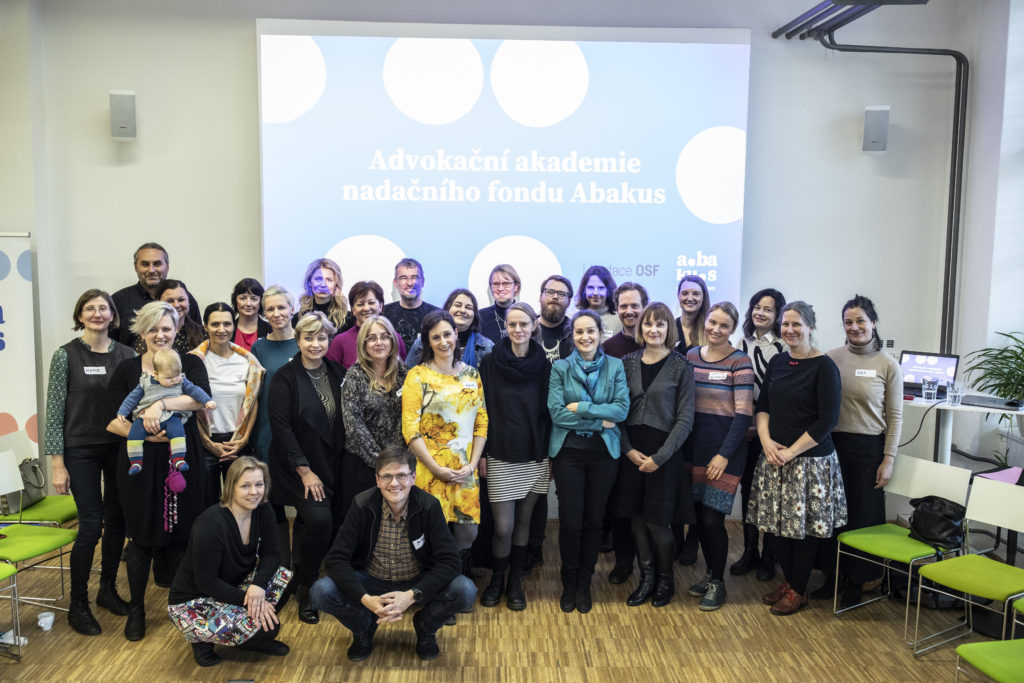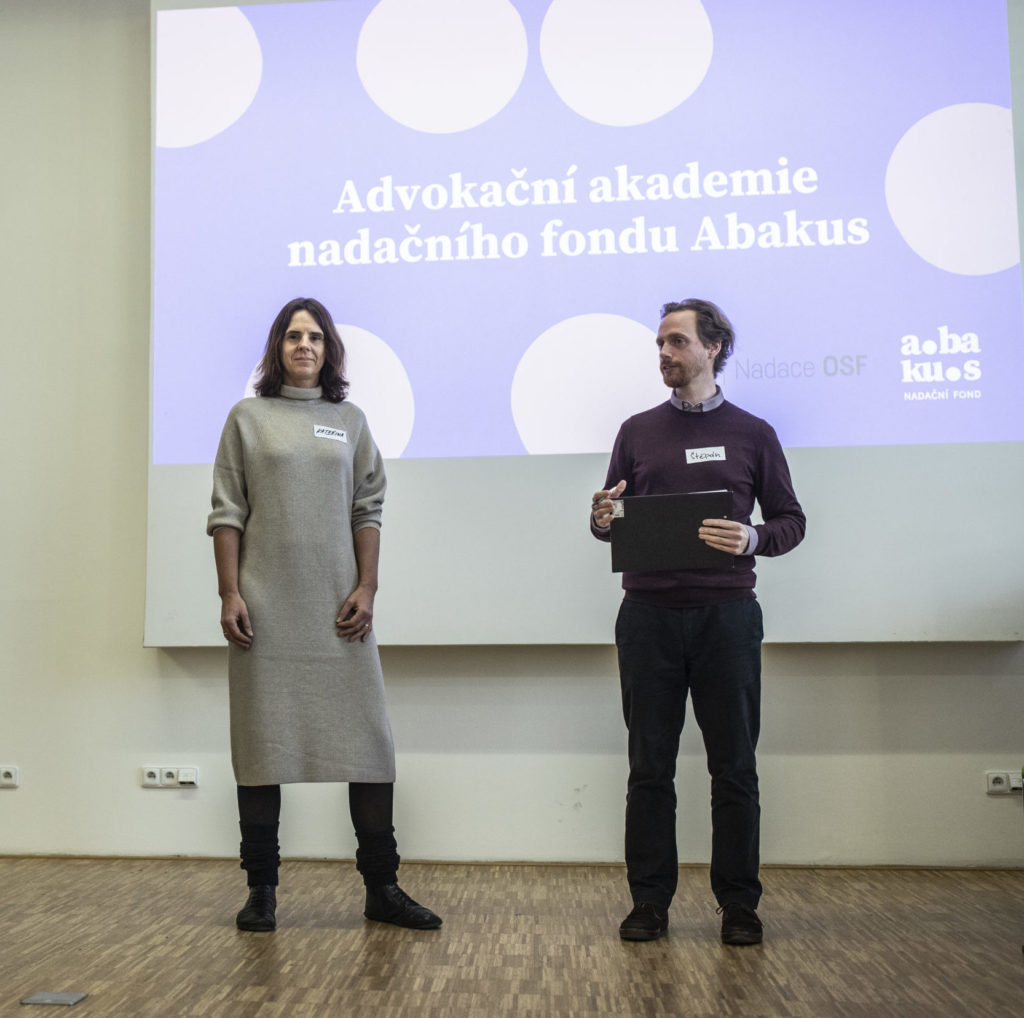Courage, motivation, allies, perseverance… These were the prerequisites for a successful advocacy campaign mentioned at the recent final meeting of the Advocacy Academy of the Abakus Foundation by organisations that focus on families with children with disabilities. Thanks to the grant program, they received funding for their advocacy project and, in addition, over a period of 2 years, participated in a series of tailored consultations with OSF’s Advocacy Forum expert team, who assisted them in articulating their needs and advocating for change for the better.

“We opened the Advocacy Academy with the understanding that the biggest experts on the needs of children with disabilities are their parents. We wanted to give them and the organizations that advocate for their needs the tools to be able to articulate and advocate for them in the right place and at the right time. Thanks to the great effort and determination of the organizations involved and with the help of the OSF Advocacy Forum, I think we have succeeded. The successes of individual advocacy projects only confirm this,” says Kateřina Kotasová, Programme Manager of the Abakus Foundation.
So what has been achieved after 2 years of intensive work?
Under the leadership of consultant Magdalena Klimešová and consultants Štěpán Drahokoupil, Petr Machálek, Milan Štefanec, and Martin Ander, the organizations discovered that advocacy is a discipline that has its own methods. They have learned to manage the preparatory phase well, where they rely mainly on data. From the forest of problems, they drew one tree and set an achievable goal. They stopped being afraid to be assertive and started looking for allies. In the end, they were one step ahead of the other stakeholders. And the results came!
The Czech Association for Rare Diseases and the Cystic Fibrosis Patients’ Club jointly pushed through crucial points in the amendment to the Health Insurance Act, thanks to which orphan drugs are now allocated in a systematic and fair way. They managed to do it all in literally last seconds possible, in the last vote of the Chamber of Deputies before the end of the term of office. “Already during the preparation of the amendment, we managed to find a compromise with all stakeholders (patients, experts, the State Institute for Drug Control, the Ministry of Health, insurance companies, and representatives of the pharmaceutical industry) and together we proposed the formulation of points in the amendment,” said Simona Zábranská and René Břečťan, spokespersons for the organizations.
Last year, representatives of the Perinatal Hospice Child at Heart organized a successful international conference on perinatal loss and developed a methodology for health professionals on how to work with clients who face the loss of a baby at any stage of pregnancy, during or shortly after birth. “We entered the Advocacy Academy with a set of problems we wanted to address, the number and difficulty of which overwhelmed us. Thanks to the consultants, we sorted our thoughts and chose what to start with and what to focus on,” said Kristýna Štefanides, Alena Peremská, and Marcela Vraspírová. “In the end, we decided to create Procedures for Care in Perinatal Loss for hospitals. We consulted the recommendations in them with about 50 independent experts from the healthcare and related fields. We are now in a pilot phase, getting feedback from use in practice. Some hospitals have already implemented the Care Pathways as their nursing standards,” they added.
Markéta Jandeková of Jdeme Autistům Naproti highlighted the opening of a mock dental office in Olomouc with the participation of high-ranking politicians from the Olomouc Region as a key success of the two-year advocacy campaign. “Most people do not look forward to visiting the dentist. For patients with autism spectrum disorders, it is often an insurmountable problem. In Olomouc, a special training dental office has been set up for them. The children can try out the dentist’s visit as a mock test,” said Markéta. Shortening the appointment times for dental treatment under general anesthesia, which mentally handicapped patients or autistic people often need, remains a long-term goal. The organization is also working with the Olomouc Regional Authority to radically shorten this process, which currently takes up to two years in the state health system. “We see a change in the thinking of individual members of the staff of the Olomouc Hospital. Colleagues from the mobile hospice You Are Not Alone, whom we connected with thanks to lecturers from the OSF Fund’s Advocacy Forum, have also helped us in this,” she added.
Together, they went to the first meeting at the Ministry of Education, Youth, and Sports armed with an analysis by PAQ Research, which shows, among other things, that for every fifth child with special educational needs, someone has suggested or demanded that parents transfer their child to another school, even though that is illegal. At a roundtable in the Senate, where they managed to get key stakeholders to sit down for a joint meeting, they then got a promise from the Ministry of Education that they would take the demands of Together z.s. into account when they drafted an amendment to the law in the spring of 2023. And how did the Advocacy Academy help them? “Without regular consultation, we would have tended not to be assertive or to give up altogether. Thanks to the Advocacy Academy, we are not afraid to push, to keep trying and trying and not to feel inappropriate or undignified,” Iva Janská and Veronika Doležilová summed up their two-year cooperation.’
The Anabell Center is seeking an amendment to the law to regulate content on social media, i.e., articles, ads, pro-anorexia groups, or retouched photos that reinforce eating disorders. “Finally, together with other experts, we had the opportunity to discuss this topic in a place where they may not have known until then that all social networks exist, what is happening on them in relation to eating disorders, and how paradoxically safe children and adolescents feel in this dangerous world,” explained Eva Slezáková from the Anabell Centre. The meeting was also armed with data obtained in cooperation with experts from Palacký University in Olomouc. As a result, further meetings are planned, e.g. with the Government Commissioner for Human Rights and the Deputy Minister of Justice, where they will discuss further possible steps to address the topic of eating disorders through legislation.
You are not alone – the Mobile Hospice is a group of doctors, nurses and parents who are working in their advocacy campaign to ensure that the rights of hospitalized children in hospitals in the Olomouc Region are respected. They do not seek to change the laws – they are set well. They are seeking to change the attitude of the staff, which is perhaps more difficult than changing the legislation. That is why they have created an educational storyboard and are bringing inspiration to hospitals, where they are demonstrating how to demolish the myth that, for example, unrestricted accompaniment of child patients by parents is not possible. “Thanks to the Advocacy Academy, we have discovered that advocacy is a discipline that has its own methods. We were also enriched by meeting other participants who deal with similar topics,” Jan Hálek summarized the benefits of the program.
ANULIKA started the advocacy campaign with an analysis that shows the reduced availability of health care in Ostrava Hospital from the perspective of patients. This was followed by a long series of seemingly small, ant-like steps that lead to a gradual change in the mindset of the staff, not only in the neuromuscular center, and then to partial systemic changes. This has been helped by forging alliances with other organizations, such as the Guidance Centre. “The most important moment of our whole effort was when we realized that we were not alone. We have the Abakus Foundation and the OSF Advocacy Forum and our community of parents standing with us. We learned how to negotiate – we build our arguments on proven data and form strong partnerships,” said Martina Martušková and Lenka Sztwiertniová from ANULIKA.
Representatives of the Society for the Support of People with Mental Disabilities (SPMP) consider a key turning point in their advocacy work to be the moment when parents themselves took the initiative in individual parent groups and gradually began to actively fight for improved services for their children. “There was frustration in the beginning because we ourselves were not sure what we were promising to these parent groups and how to do it. But now, thanks to the Advocacy Academy, parents know what it’s about and that it can be done,” recall Jana Stejskal and Camille Latimier. They succeeded in activating parents by setting one tangible goal at the beginning, which the parents used to test that the ice can be broken. Each of the three parent groups they work with went about it differently. But the result was always a success, which motivated them to set and conquer more goals.
The continuous advocacy campaign Care without Barriers has resulted in the opening of the first respite service for families with children with disabilities in Prague, which also offers overnight accommodation. But it was a long run, and at times it looked like the negotiations would not end well. On the advice of consultants from the Advocacy Academy, they held a roundtable, due to the online covid, and presented the stakeholders with a legal analysis from Frank Bold. As a result, the Prague 10 municipality finally agreed to re-claim the selected space as an apartment where the first children could sleep for the next six months. “We heard the term round table for the first time at the consultation and we could not imagine that we would be able to organize something like this. But in the end, there was nothing left. So this online roundtable was probably the most important moment in our campaign. And we owe it to the lovely consultants that we dared to do it,” concluded Jarmila Neuwirthová and Magdalena Tomášková.

Advocacy Forum OSF is a professional partner of the Advocacy Academy of the Abakus Foundation, which has financially supported the advocacy activities of 10 organizations focusing on families with children with disabilities. The aim of the program is to support organizations in articulating the needs of families and advocating for their rights so that they can live better lives. “A big thank you to the Abakus Foundation for their great cooperation. Thanks to their approach built on trust, openness, and partnership, we were able to prepare the accompanying program of the Advocacy Academy directly tailored to the needs of the organizations in it, which is absolutely essential for the success of their advocacy campaigns,” evaluated the cooperation Štěpán Drahokoupil, Program Specialist of the Advocacy Forum of the Open Society Fund Prague.





